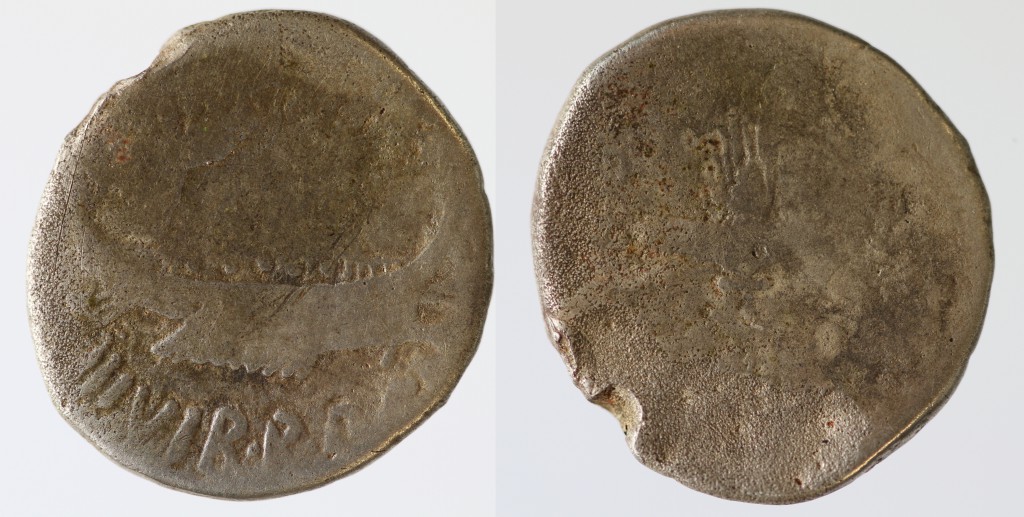November 27, 2015, by Will Leveritt
On this day in 43 BC, the Lex Titia was passed at Rome
Text by Harry Tanton
Image by Sarah Jordan
The passage of the Lex Titia on the 27th November 43 BC legalized the collective rule of three statesmen over the Roman Republic and effectively signified its demise and the rise of autocracy: by the terms of the law Lepidus, Marc Antony, and Octavian (the future emperor Augustus) formed what is known today as the Second Triumvirate (the First Triumvirate of Caesar, Pompey, and Crassus was never a formal alliance).
The assassination of Julius Caesar, the dictator perpetuo (dictator for life), in 44BC, plunged Rome into civil war as two factions – the Caesareans and the assassins of Caesar (who labelled themselves liberatores) – competed to fill the position that he had vacated. The former wished to accede to Caesar’s position as master of the Roman world; the latter sought to restore the Republic.
Within the Caesarean faction, Mark Antony (brother-in-arms and lieutenant to Caesar), Octavian (Caesar’s heir and adopted son) and Lepidus (magister equitum during Caesar’s dictatorship) competed with one another, utilising their connection with Caesar to curry favour with his armies and faction members.
Despite the personal ambitions of the three men, the need to rid themselves of the liberatores obliged them to collaborate. In early 43 BC Antony decided he wanted to govern the province of Cisalpine Gaul and invaded it with the intention of removing the legitimate governor, Decimus Brutus (one of the liberatores). He was defeated by senatorial forces which were led by the consuls Hirtius and Pansa but which also included troops raised by Octavian (who was also present).
In the aftermath of the battle, rather than attempt to get rid of a rival for power, Octavian (who in August 43 BC had marched on Rome and had himself made consul) met with Antony and Lepidus in October and concluded the agreement that united them in the Second Triumvirate. They arranged for the passage of the Lex Titia, which was ratified on 26 November, 43 BC.
With the rest of the liberatores having long since fled to the East after Antony’s emotive speech at Caesar’s funeral (which roused the mob against them), the Second Triumvirate was the most powerful entity in Rome.
Initially the Second Triumvirate was successful in fulfilling its aims. Through proscriptions they eradicated those who stood opposed to them, which even involved the assassination of Cicero. At Philippi in 42 BC the last of the liberatores, Brutus and Cassius, paid for their opposition with both their lives and their cause; their attempts to revive the Republic had failed.
However, with their external enemies gone, the Second Triumvirate became increasingly unstable. Underlying tensions and rivalries never really dissipated and disputes between the members were perhaps inevitable.
First to be ostracised was Lepidus. The triumvirs had divided the empire between themselves, with Octavian gaining control of the West, Antony the East, and Lepidus Africa. In a highly naïve move Lepidus stationed troops in Sicily in an effort to help defeat Sextus Pompeius (the son of Pompey the Great) who had been mounting a disruptive campaign of piracy against Octavian. He asserted that the island should come under his jurisdiction, a claim Octavian used to paint Lepidus as a usurper. Lepidus’ forces subsequently defected to Octavian and Lepidus was exiled.
The Triumvirate was subsequently dissolved in 33 BC as a showdown between Antony and Octavian became increasingly likely. These two had always been the leading lights of the Triumvirate and the main rivals for ultimate power.
Octavian finally declared war on Antony in 32 BC, using as his excuse Antony’s alliance with the Egyptian queen Cleopatra, which he presented as a grave threat to Rome. Particularly useful in this regard was Antony’s will, in which it was discovered that he and Cleopatra planned to give away much of the East, including some Roman territory, to their children.
Victorious over Antony at the Battle of Actium in September of 31 BC, Octavian was left without political rivals and as such was free to establish himself as Rome’s first emperor, Augustus, in 27 BC.
No comments yet, fill out a comment to be the first


Leave a Reply